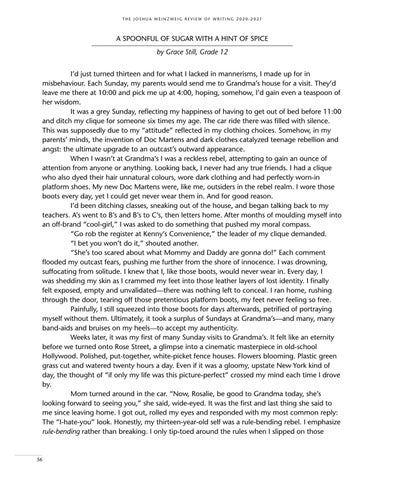THE JOSHUA WEINZWEIG REVIEW OF WRITING 2020-2021
A SPOONFUL OF SUGAR WITH A HINT OF SPICE ____________________________________________________________ by Grace Still, Grade 12 I’d just turned thirteen and for what I lacked in mannerisms, I made up for in misbehaviour. Each Sunday, my parents would send me to Grandma’s house for a visit. They’d leave me there at 10:00 and pick me up at 4:00, hoping, somehow, I’d gain even a teaspoon of her wisdom. It was a grey Sunday, reflecting my happiness of having to get out of bed before 11:00 and ditch my clique for someone six times my age. The car ride there was filled with silence. This was supposedly due to my “attitude” reflected in my clothing choices. Somehow, in my parents’ minds, the invention of Doc Martens and dark clothes catalyzed teenage rebellion and angst: the ultimate upgrade to an outcast’s outward appearance. When I wasn’t at Grandma’s I was a reckless rebel, attempting to gain an ounce of attention from anyone or anything. Looking back, I never had any true friends. I had a clique who also dyed their hair unnatural colours, wore dark clothing and had perfectly worn-in platform shoes. My new Doc Martens were, like me, outsiders in the rebel realm. I wore those boots every day, yet I could get never wear them in. And for good reason. I’d been ditching classes, sneaking out of the house, and began talking back to my teachers. A’s went to B’s and B’s to C’s, then letters home. After months of moulding myself into an off-brand “cool-girl,” I was asked to do something that pushed my moral compass. “Go rob the register at Kenny’s Convenience,” the leader of my clique demanded. “I bet you won’t do it,” shouted another. “She’s too scared about what Mommy and Daddy are gonna do!” Each comment flooded my outcast fears, pushing me further from the shore of innocence. I was drowning, suffocating from solitude. I knew that I, like those boots, would never wear in. Every day, I was shedding my skin as I crammed my feet into those leather layers of lost identity. I finally felt exposed, empty and unvalidated—there was nothing left to conceal. I ran home, rushing through the door, tearing off those pretentious platform boots, my feet never feeling so free. Painfully, I still squeezed into those boots for days afterwards, petrified of portraying myself without them. Ultimately, it took a surplus of Sundays at Grandma’s—and many, many band-aids and bruises on my heels—to accept my authenticity. Weeks later, it was my first of many Sunday visits to Grandma’s. It felt like an eternity before we turned onto Rose Street, a glimpse into a cinematic masterpiece in old-school Hollywood. Polished, put-together, white-picket fence houses. Flowers blooming. Plastic green grass cut and watered twenty hours a day. Even if it was a gloomy, upstate New York kind of day, the thought of “if only my life was this picture-perfect” crossed my mind each time I drove by. Mom turned around in the car. “Now, Rosalie, be good to Grandma today, she’s looking forward to seeing you,” she said, wide-eyed. It was the first and last thing she said to me since leaving home. I got out, rolled my eyes and responded with my most common reply: The “I-hate-you” look. Honestly, my thirteen-year-old self was a rule-bending rebel. I emphasize rule-bending rather than breaking. I only tip-toed around the rules when I slipped on those
–––––––––––––––––––––––––––––––––––––––
56











